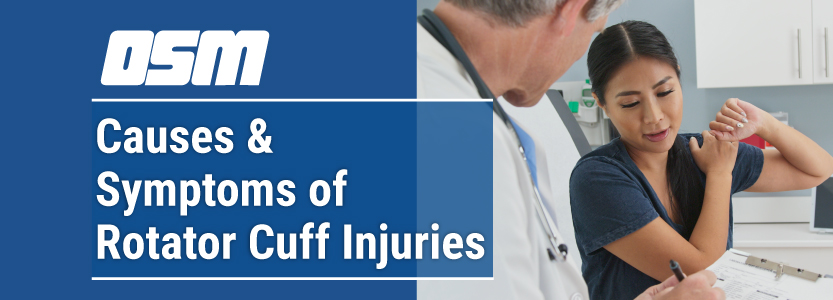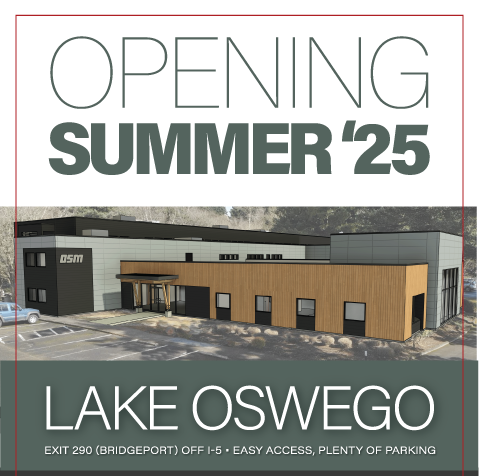Symptoms & Causes of Rotator Cuff Injuries
What is a rotator cuff?
Your rotator cuff is part of your shoulder joint. It’s a group of muscles and tendons that holds the top part of your upper arm bone firmly in your shoulder socket. The rotator cuff keeps your shoulder stable when you move your arm in any direction.
What are rotator cuff injuries?
Rotator cuff injuries are common. Most of them are wear-and-tear injuries from doing the same arm movements over and over – especially reaching over your head. With time, the tissues in the rotator cuff break down, leading to these injuries:
- Tendinitis. The tendons in the rotator cuff connect your muscles to your shoulder bones. In tendinitis, the tendons become irritated and swollen from being pinched during shoulder movements.
- Bursitis. The bursa is a small, fluid-filled sac that pads the space between the rotator cuff and the bones of your shoulder. Bursitis happens when the muscle and bone rub the bursa too much. It swells with extra fluid, which causes pain
- Rotator cuff tears. Tears in a rotator cuff tendon can happen over time or suddenly from an injury, such as falling on an outstretched arm or lifting something heavy. A tear may go part way through a tendon (partial tear) or all the way through (full tear).
Who is more likely to develop a rotator cuff injury?
Anyone can develop a rotator cuff injury. But certain people are more likely to have one:
- People over age 40. Most rotator cuff injuries are from the wear and tear of aging. By age 80, most adults have tears.
- Athletes. Playing sports with repeated shoulder movements increases the risk of a rotator cuff injury, for example, tennis, swimming, and baseball – especially pitching.
- People in jobs that require a lot of reaching overhead or heavy lifting. Carpenters, construction workers, and painters are examples of workers who may be more likely to have rotator cuff problems.
What are the symptoms of rotator cuff injuries?
Rotator cuff injuries don’t always cause pain. But when they do, the pain is often in the top part of your arm or shoulder. You may feel more pain when you:
- Lie down, especially on the injured shoulder
- Lift your arm or lower it to the front or side
- Reach behind your back
Other symptoms from a torn rotator cuff may include:
- Loss of strength in the arm
- Clicking or popping sounds when you move your arm
How are rotator cuff injuries diagnosed?
To find out if you have a rotator cuff injury, your health care provider:
- Will examine your shoulder. This includes checking the range of motion and where the pain is.
- Will test your arm and shoulder strength.
- May order imaging tests, such as x-rays, an ultrasound, or an MRI scan.
What are the treatments for rotator cuff injuries?
The best treatment for you depends on your age, how much your injury bothers you, and whether your injury was sudden or happened from wear and tear.
Treatments for rotator cuff injuries often include:
- Rest
- Putting ice or a cold pack on the sore area
- Pain relievers to lessen pain and swelling, such as ibuprofen or aspirin
- Physical therapy exercises to strengthen your shoulder and improve movement
- A corticosteroid shot into your shoulder joint if other treatments don’t help with the pain
Treatments for rotator cuff tendinitis and bursitis may also include ultrasound therapy. Surgery may be an option if your shoulder doesn’t feel better in 6 to 12 months.
Treatments for a torn rotator cuff may also include heat to the sore area or electrical stimulation of the nerves and muscles (transcutaneous electrical nerve stimulation, TENS).
You provider may suggest surgery if your tear is large or is from a recent injury, or symptoms last for 6 to 12 months.
When should I see a health care provider for shoulder pain?
If certain activities bother your shoulder, it’s best to stop doing them and check with your provider. That’s because early treatment can prevent mild rotator cuff injuries from becoming more serious later on. If you your arm feels weak right after a sudden injury to your shoulder, see your provider as soon as possible.
The Orthopedic & Sports Medicine Center of Oregon is an award-winning, board-certified orthopedic group located in downtown Portland Oregon. We utilize both surgical and nonsurgical means to treat musculoskeletal trauma, spine diseases, sports injuries, degenerative diseases, infections, tumors and congenital disorders.
Our mission is to return our patients back to pain-free mobility and full strength as quickly and painlessly as possible using both surgical and non-surgical orthopedic procedures.
Our expert physicians provide leading-edge, comprehensive care in the diagnosis and treatment of orthopedic conditions, including total joint replacement and sports medicine. We apply the latest state-of-the-art techniques in order to return our patients to their active lifestyle.
If you’re looking for compassionate, expert orthopedic surgeons in Portland Oregon, contact OSM today.
Phone:
503-224-8399
Address
1515 NW 18th Ave, 3rd Floor
Portland, OR 97209
Hours
Monday–Friday
8:00am – 4:30pm




